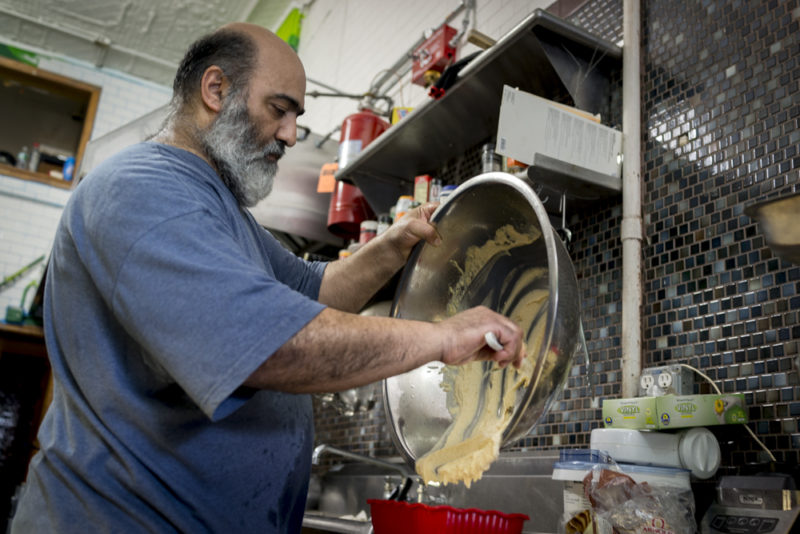
New York filmmaker Spike Lee may be well-known as a Fort Greene native, but Ralph Jawad is better recognized by most locals. The longstanding “mayor” of the neighborhood is the owner of a bodega on South Portland Ave. and Lafayette St., where it’s simply known as Ralph’s.
Although the strip near Fulton St. Station has become more vibrant in recent years, with newer shops, Ralph’s corner bodega stands as a constant. It’s a place where you can leave spare apartment keys for emergencies or take goodies and pay later if you’re short of money. The bodega sells mostly beverages, chips, and other basic necessities. A chalkboard menu above the kitchen wall offers a list of American breakfasts, such as bagels, or ham-cheese-and-egg sandwiches. Dozens of dollar bills are attached on the wall, with handwritten phrases such as “Mr. Fort Greene, keep it real,” “Mayor of Ft. Greene,” or “Town Hall Ralph’s.”
On a recent summer morning, after the rush hour when customers stream in for coffee or just to say “Hi, Ralph,” the 52-year-old owner shuffles back and forth in a small kitchen area behind the tall wooden cash register. Jawad plugs in the power cord of a large electronic mixer, collects the food he plans to cook—including a can of chickpeas and tahini, key ingredients for hummus. He then takes out a silver pot where some ingredients have marinated for two days: tender meat with flavors of black pepper, corn, and garlic. This mix is slowly steamed on top of a grill, part of the preparation for a brisket sandwich. He’s not making any American breakfasts. Instead, he is performing another daily kitchen task: making off-the-menu Middle Eastern food for himself and his friendly patrons.
It is sweltering, due to the lack of an air conditioner, but Jawad doesn’t seem mind the steam that makes his gray shirt wet on his big, burly figure. “It’s healthier food, man,” says Jawad, in his heavy Brooklyn accent. “It’s lighter. I don’t think there’s anything heavy. Hummus is good for you to get protein. So is falafel and baba ghanoush.”
Despite Jawad’s Brooklyn roots, he clearly finds his identity as a Palestinian. He followed his parents, who immigrated to the States in the 1960s. His father, Abdel Jawad, opened and ran the bodega until Ralph took over in the mid-80s. “I dropped out of high school and was just hanging out. So my dad tried to make me work every day,” he said. “I ended up staying here without going back to school.”
He mainly learned how to cook Middle Eastern food from his mother, now 74. “She used to put things together really quick for us. Especially when she had to raise seven children,” he said. “I would just watch her and see what she specifically put in,” he recalls, as he pours in chickpeas in a mixer, adding a handful of garlic, a pinch of ground cumin, and baking soda.
Jawad goes on to put in a dairy product from his home country that he insists he must conceal. “It’s a key ingredient from my home country that a lot of cooks don’t realize to include when making hummus,” he says. The secret ingredient, he said, makes the hummus creamy.
He finishes the mix in a large silver bowl with tahini, a paste made from crushed sesame seeds. “Look at this, man. It’s beautiful,” he says, “I feel like I make better hummus than my mom.” He looks eager to see me try it, and hands me the hummus on some pita bread, spiced with sumac. The hummus is so exceedingly savory that it encourages me to ask for more.
Jawad is considering to turn his bodega into a café, a small restaurant that would serve Middle Eastern food. Aside from serving American breakfast foods, he has been cooking food from his home country for three years. Recently, he has been letting patrons taste his fresh hummus, sandwiches of briskets or falafel . If some of them ask for more, he sells his off-menu food for five dollars. “A lot of patrons until this day would say why not put up a sign and say that you sell this?” he says, “When I get ready to flip everything over, I’m just going to have a big surprise, you know?”
Nancy Pascal, 45, who’s been one of his patrons for nearly 20 years, says she loves his hummus and always tries to taste something during her daily visits. “He also makes the best falafel. It’s fresh and homemade, and it comes from his country so he knows what he’s doing,” she said. “If you sit here long enough, you’ll get a taste of something.”
Longtime residents say that Jawad’s bodega is considered as a community center. Alison Cornyn has been calling him the mayor of Fort Greene ever since she moved in to an apartment across the street 12 years ago. “He would connect us to a handyman and people that he knows,” she said. Ralph’s is the only secure place she would allow her 12-year-old daughter to go pick up some milk, “because he watches them crossing the street for me.”
Nancy Pascal agrees that it’s not an ordinary bodega. That’s why she is opposed to Ralph’s potential plan to transform the bodega into an eatery. “Where else are we going to come and pick up the local gossip?” she said. “This is the spot to find out what’s happening in Brooklyn, news of who’s selling, buying properties.”
Jawad is not 100 percent sure about the shift, either. “This is the oldest store in Fort Greene, one of the oldest in Brooklyn. Tourists come in and take pictures because of that,” he says. “This makes you hesitate.”
Next year will be his 40th anniversary in the bodega. Whether he’ll change his bodega into an eatery, he’s unsure. But either way, Jawad says he is not going anywhere.


Leave a Reply